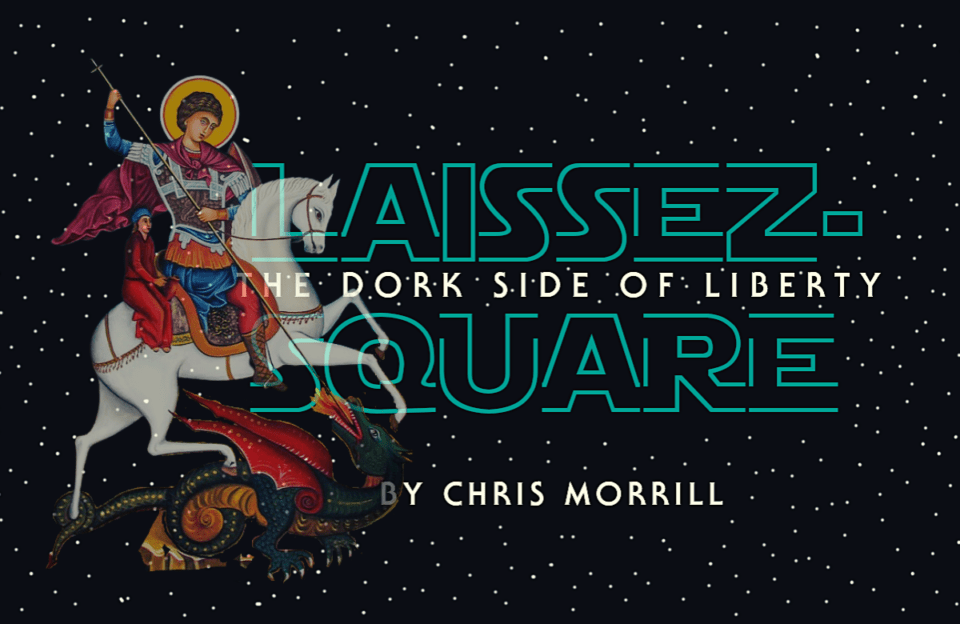St. George’s Day, the national holiday of England, comes and goes every April 23 with little fanfare in the United States. And apparently not a lot in England, either. That’s a bloomin’ shame, if you ask me.
As I posted on Facebook on April 23 a few years back:
Happy St. George’s Day! How best to celebrate England’s national day? Have some tea and crumpets? Sip a gin and tonic in the afternoon? Skip a trip to the dentist? Colonize some far away land and introduce them to western civilization whether they want it or not? Simply go to work and have a productive day because those bloody bills aren’t going to pay themselves, you know?
(It’s not as simple as St. Patrick’s Day, which apparently just involves wearing green and getting snockered.)
The United States makes a huge fuss over St. Patrick’s Day while practically ignoring St. George’s Day. That’s super weird to me, because we owe much more to the English than we do to the Irish. Our legal system is based on English common law. Many of our cultural and musical traditions come from jolly old England. We have fought side by side with our English friends in several conflicts, leading to the coining of the term “The Special Relationship.” And obviously, we speak their language. (Though obviously not as well as they do. Everything sounds better in an English accent.)
If demographics are destiny, one would tend to think that the future looks very Chinese. Or maybe Hispanic. Neither of those things are necessarily bad; the worst thing about a Chinese future would no doubt be their awful system of government.
I hope that English manages to survive and even thrive in the future. While it’s a notoriously difficult language to learn and our spellings and pronunciations are all over the place, one can’t argue with the profound effect the language and the culture have had on the world.
Things haven’t exactly been copacetic in the mother country. The trauma of Brexit was largely driven by England while being staunchly opposed in Scotland and Northern Ireland. The U.K. leaving the European Union sparked some serious talk about the U.K. itself disintegrating.
If England were to turn its back on Europe, and even on some parts of its own island, where would they turn?
Why not us? Why not just put the band back together? As long America’s in charge. (Which, population-wise, we would be.)
The Anglosphere, loosely defined at the English speaking world, totals 6% of the world’s population and 17% of the world’s land. The “core” Anglosphere would be heavily dominated by the United States (328.2 million people), followed by the United Kingdom (67.8 million), Canada (38 million), Australia (25.7 million), and New Zealand (5.1 million.)
But wait, there’s more! A broader definition of the Anglosphere that brings in all the world’s English speakers would be considerably larger. The big prize here would be India and its 1.2 billion souls. Which could, technically, put them in charge of the Anglosphere. (And it has been my experience that many Indians are far more English in their mannerisms and habits than Americans are.)
But you would also bring in some other good-sized countries like Pakistan, Nigeria, Bangladesh, the Philippines, and even Israel. (Pakistan might be a stretch given that what happened with Osama bin Laden a decade ago, but if we can still be in NATO with Turkey at this point, anything is possible.) An extended Anglosphere would more than blunt the possible impact of Scotland going its own way, or Northern Ireland reuniting with the rest of Ireland. Though of course they would both be welcome to stay.
There already exists an organization of English-speaking countries: The Commonwealth of Nations. It’s largely a collection of former British colonies, most of which recognize the British monarch as their titular head of state. Conspicuously absent from the Commonwealth are Ireland and the United States. The Irish have their reasons, as do we. But you don’t even have to recognize the queen as your head of state to be in this group anymore; they’ve accepted republics since 1949 (though somewhat grudgingly.)
Why not take that concept and make a big free trade zone and military alliance? Think “Commonwealth Plus.” We’re already in bed militarily and intelligence-wise with the big players anyway through the Five Eyes and the UKUSA Agreement. I know libertarians are inherently hostile to foreign entanglements, but China doesn’t share these high minded ideals. Such an arrangement may be inevitable.
The bad:
Well, that whole monarchy business. Most Americans, despite our weird fascination with the House of Windsor, are never going to bend the knee. Even symbolically. But as noted above, republics aren’t out of the question in the Commonwealth.
Then there’s that whole weird thing about the U.K. having an official state religion. Again, that’s easy enough to deal with, as it’s not really a requirement.
Americans are never likely to become fond of cricket or hot tea.
The English may never completely go along with extensive dental work.
It also seems quite unlikely that our Commonwealth brethren will ever catch on with American gun culture, which is shame, because they’re totally missing out. That shit is fun.
And some parts of the extended Anglosphere, as noted before, may want to go their own way. Thinking maybe of Quebec or Puerto Rico here.
The good:
As mentioned, the largely shared language, legal system, and parts of the culture.
Plus let’s be honest: if there was an Anglosphere Parliament including the U.S., India, Pakistan, Israel, the U.K., Canada, Australia, and New Zealand, Prime Minister’s Questions would be absolutely fucking lit. It would be must see TV. (Or “must see telly,” if you’re already getting all English just by reading this.)
Plus, the English could certainly teach us a thing or two about proper soccer hooliganism.
Last but not least, the flag. While everyone agrees that the Stars and Stripes is a fine looking flag, the Union Jack is absolute fire. (Even if you had to take out the Irish part.) The Grand Union Flag could be a compromise, bringing with it the best of both worlds.
Now, you might argue: “This whole Anglosphere idea is an ugly vestige of colonialism at best, and kind of racist at worst!”
The colonialism thing certainly has an ugly side. But have you ever noticed that most former British colonies maintain good ties with the mother country? (Even if, like us, it took them a while to come around?) Some former possessions of The Crown are still a little sore over the whole thing, sure, but by and large they came out better for it.
The idea that this concept could be racist is poppycock, balderdash, and rubbish. “English”, as a language and culture, goes far beyond actual Anglo-Saxons. The Commonwealth Plus, as proposed, would be in fact be the most diverse nation on the planet. From the Maori of New Zealand to the Blacks of the former British Caribbean to the Indians, Pakistanis, and Bangladeshis of the former British Raj, it would be hella diverse. Just all speaking the same language.
The best:
Even an ascendant China might want to think twice before messing with such a rowdy bunch.





1 comment
… [Trackback]
[…] Here you will find 78912 more Info on that Topic: thelibertarianrepublic.com/i-cheer-you-cheer-we-all-cheer-for-the-anglosphere/ […]